英语词汇固定搭配用法和典型案例
- 格式:docx
- 大小:24.94 KB
- 文档页数:3
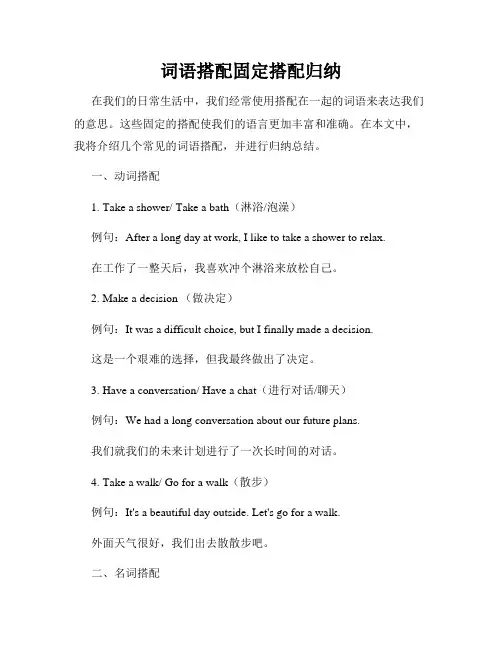
词语搭配固定搭配归纳在我们的日常生活中,我们经常使用搭配在一起的词语来表达我们的意思。
这些固定的搭配使我们的语言更加丰富和准确。
在本文中,我将介绍几个常见的词语搭配,并进行归纳总结。
一、动词搭配1. Take a shower/ Take a bath(淋浴/泡澡)例句:After a long day at work, I like to take a shower to relax.在工作了一整天后,我喜欢冲个淋浴来放松自己。
2. Make a decision (做决定)例句:It was a difficult choice, but I finally made a decision.这是一个艰难的选择,但我最终做出了决定。
3. Have a conversation/ Have a chat(进行对话/聊天)例句:We had a long conversation about our future plans.我们就我们的未来计划进行了一次长时间的对话。
4. Take a walk/ Go for a walk(散步)例句:It's a beautiful day outside. Let's go for a walk.外面天气很好,我们出去散散步吧。
二、名词搭配1. Catch someone's attention(吸引某人的注意力)例句:The colorful advertisement caught my attention while I was walking by.当我走过时,这个色彩缤纷的广告吸引了我的注意力。
2. Gain/lose weight(增肥/减肥)例句:I need to go on a diet, I've gained too much weight recently.我需要节食了,最近体重增加太多了。
3. Take a break(休息一下)例句:After studying for hours, I decided to take a break and go for a walk.学习了几个小时后,我决定休息一下,出去散散步。
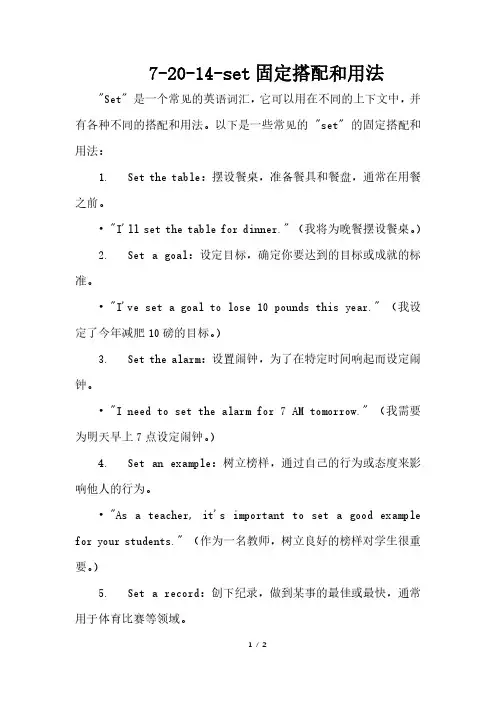
7-20-14-set固定搭配和用法"Set" 是一个常见的英语词汇,它可以用在不同的上下文中,并有各种不同的搭配和用法。
以下是一些常见的 "set" 的固定搭配和用法:1. Set the table:摆设餐桌,准备餐具和餐盘,通常在用餐之前。
• "I'll set the table for dinner." (我将为晚餐摆设餐桌。
)2. Set a goal:设定目标,确定你要达到的目标或成就的标准。
• "I've set a goal to lose 10 pounds this year." (我设定了今年减肥10磅的目标。
)3. Set the alarm:设置闹钟,为了在特定时间响起而设定闹钟。
• "I need to set the alarm for 7 AM tomorrow." (我需要为明天早上7点设定闹钟。
)4. Set an example:树立榜样,通过自己的行为或态度来影响他人的行为。
• "As a teacher, it's important to set a good example for your students." (作为一名教师,树立良好的榜样对学生很重要。
)5. Set a record:创下纪录,做到某事的最佳或最快,通常用于体育比赛等领域。
• "The athlete set a new world record in the 100-meter sprint." (这名运动员在100米短跑中创造了新的世界纪录。
)6. Set the stage:布置舞台,准备一个事件或表演的场地和设备。
• "The crew is working hard to set the stage for the concert tonight." (船员们正在努力为今晚的音乐会布置舞台。
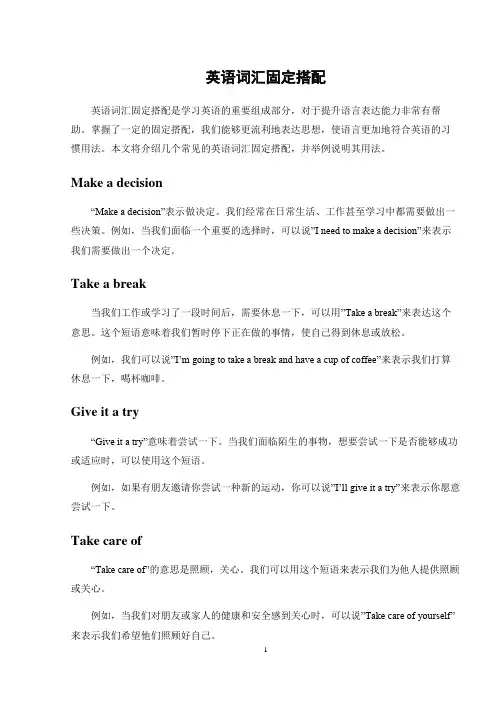
英语词汇固定搭配英语词汇固定搭配是学习英语的重要组成部分,对于提升语言表达能力非常有帮助。
掌握了一定的固定搭配,我们能够更流利地表达思想,使语言更加地符合英语的习惯用法。
本文将介绍几个常见的英语词汇固定搭配,并举例说明其用法。
Make a decision“Make a decision”表示做决定。
我们经常在日常生活、工作甚至学习中都需要做出一些决策。
例如,当我们面临一个重要的选择时,可以说”I need to make a decision”来表示我们需要做出一个决定。
Take a break当我们工作或学习了一段时间后,需要休息一下,可以用”Take a break”来表达这个意思。
这个短语意味着我们暂时停下正在做的事情,使自己得到休息或放松。
例如,我们可以说”I’m going to take a break and have a cup of coffee”来表示我们打算休息一下,喝杯咖啡。
Give it a try“Give it a try”意味着尝试一下。
当我们面临陌生的事物,想要尝试一下是否能够成功或适应时,可以使用这个短语。
例如,如果有朋友邀请你尝试一种新的运动,你可以说”I’ll give it a try”来表示你愿意尝试一下。
Take care of“Take care of”的意思是照顾,关心。
我们可以用这个短语来表示我们为他人提供照顾或关心。
例如,当我们对朋友或家人的健康和安全感到关心时,可以说”Take care of yourself”来表示我们希望他们照顾好自己。
Keep in touch保持联系是我们与他人保持沟通的关键。
“Keep in touch”表示与他人保持联系,不断保持沟通。
例如,当我们与朋友分别时,可以说”Let’s keep in touch”来表示我们希望与对方保持联系。
Conclusion英语词汇固定搭配在日常交流中起着重要的作用。
通过掌握这些固定搭配,我们可以更加准确地表达自己的意思,提升语言表达能力。
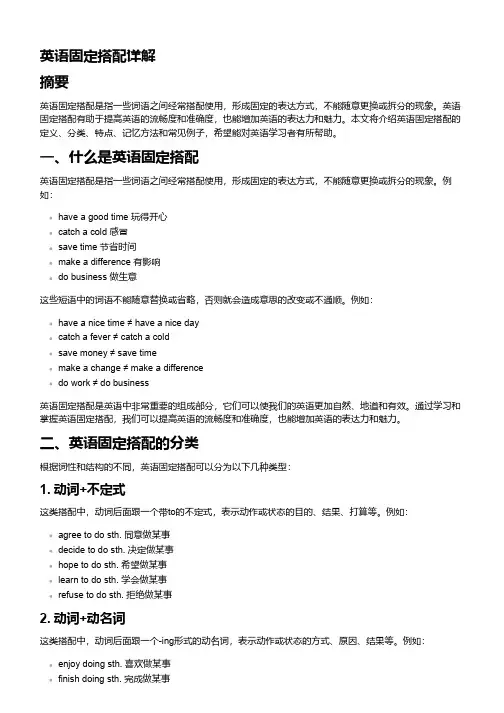
英语固定搭配详解摘要英语固定搭配是指一些词语之间经常搭配使用,形成固定的表达方式,不能随意更换或拆分的现象。
英语固定搭配有助于提高英语的流畅度和准确度,也能增加英语的表达力和魅力。
本文将介绍英语固定搭配的定义、分类、特点、记忆方法和常见例子,希望能对英语学习者有所帮助。
一、什么是英语固定搭配英语固定搭配是指一些词语之间经常搭配使用,形成固定的表达方式,不能随意更换或拆分的现象。
例如:have a good time 玩得开心catch a cold 感冒save time 节省时间make a difference 有影响do business 做生意这些短语中的词语不能随意替换或省略,否则就会造成意思的改变或不通顺。
例如:have a nice time ≠ have a nice daycatch a fever ≠ catch a coldsave money ≠ save timemake a change ≠ make a differencedo work ≠ do business英语固定搭配是英语中非常重要的组成部分,它们可以使我们的英语更加自然、地道和有效。
通过学习和掌握英语固定搭配,我们可以提高英语的流畅度和准确度,也能增加英语的表达力和魅力。
二、英语固定搭配的分类根据词性和结构的不同,英语固定搭配可以分为以下几种类型:1. 动词+不定式这类搭配中,动词后面跟一个带to的不定式,表示动作或状态的目的、结果、打算等。
例如:agree to do sth. 同意做某事decide to do sth. 决定做某事hope to do sth. 希望做某事learn to do sth. 学会做某事refuse to do sth. 拒绝做某事2. 动词+动名词这类搭配中,动词后面跟一个-ing形式的动名词,表示动作或状态的方式、原因、结果等。
例如:enjoy doing sth. 喜欢做某事finish doing sth. 完成做某事mind doing sth. 介意做某事suggest doing sth. 建议做某事avoid doing sth. 避免做某事3. 动词+介词这类搭配中,动词后面跟一个介词,构成一个短语动词,表示动作或状态的方向、范围、对象等。
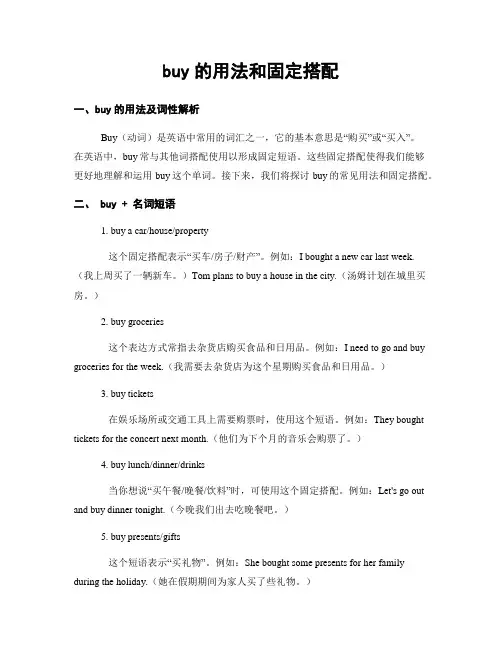
buy的用法和固定搭配一、buy的用法及词性解析Buy(动词)是英语中常用的词汇之一,它的基本意思是“购买”或“买入”。
在英语中,buy常与其他词搭配使用以形成固定短语。
这些固定搭配使得我们能够更好地理解和运用buy这个单词。
接下来,我们将探讨buy的常见用法和固定搭配。
二、 buy + 名词短语1. buy a car/house/property这个固定搭配表示“买车/房子/财产”。
例如:I bought a new car last week.(我上周买了一辆新车。
)Tom plans to buy a house in the city.(汤姆计划在城里买房。
)2. buy groceries这个表达方式常指去杂货店购买食品和日用品。
例如:I need to go and buy groceries for the week.(我需要去杂货店为这个星期购买食品和日用品。
)3. buy tickets在娱乐场所或交通工具上需要购票时,使用这个短语。
例如:They bought tickets for the concert next month.(他们为下个月的音乐会购票了。
)4. buy lunch/dinner/drinks当你想说“买午餐/晚餐/饮料”时,可使用这个固定搭配。
例如:Let's go out and buy dinner tonight.(今晚我们出去吃晚餐吧。
)5. buy presents/gifts这个短语表示“买礼物”。
例如:She bought some presents for her family during the holiday.(她在假期期间为家人买了些礼物。
)三、buy + 形容词短语1. buy cheap/expensive当你想表达“买便宜货/贵货”时,可使用这个固定搭配。
例如:He always buys cheap clothes from discount stores.(他总是从折扣店里买些便宜的衣服。
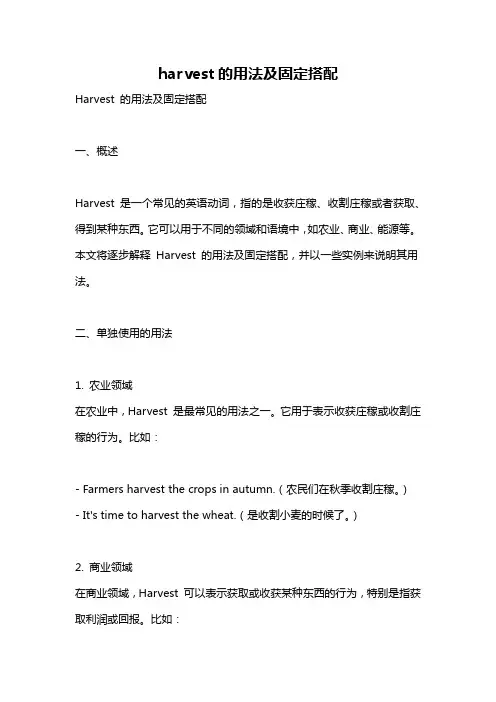
harvest的用法及固定搭配Harvest 的用法及固定搭配一、概述Harvest 是一个常见的英语动词,指的是收获庄稼、收割庄稼或者获取、得到某种东西。
它可以用于不同的领域和语境中,如农业、商业、能源等。
本文将逐步解释Harvest 的用法及固定搭配,并以一些实例来说明其用法。
二、单独使用的用法1. 农业领域在农业中,Harvest 是最常见的用法之一。
它用于表示收获庄稼或收割庄稼的行为。
比如:- Farmers harvest the crops in autumn.(农民们在秋季收割庄稼。
)- It's time to harvest the wheat.(是收割小麦的时候了。
)2. 商业领域在商业领域,Harvest 可以表示获取或收获某种东西的行为,特别是指获取利润或回报。
比如:- The company hopes to harvest significant profits from its new product.(公司希望从新产品中获得可观的利润。
)- After years of hard work, he finally harvested the fruits of his labor.(经过多年的辛勤工作,他终于收获了劳动的果实。
)3. 能源领域在能源领域,Harvest 通常指的是获取或利用自然资源的能量的行为。
比如:- Wind farms are built to harvest wind energy.(建立风电场是为了获取风能。
)- Solar panels are used to harvest solar power.(太阳能电池板被用来获取太阳能。
)三、与其他词汇搭配使用的用法1. Harvest crops这是在农业中最常见的搭配,意思是收割庄稼。
例如:- It's time to harvest the rice crops.(是收割稻谷的时候了。
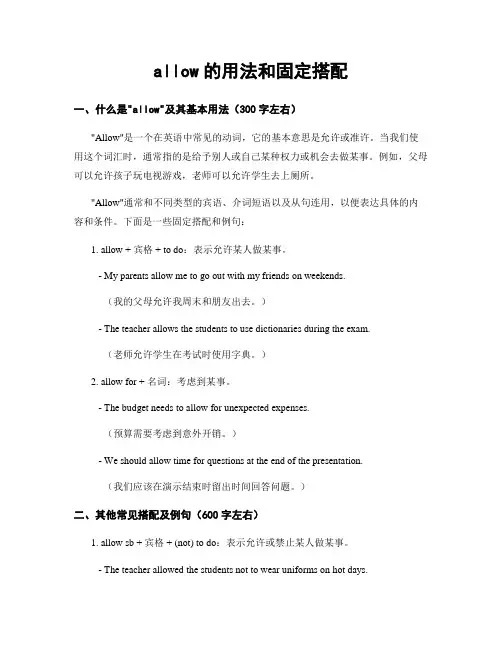
allow的用法和固定搭配一、什么是"allow"及其基本用法(300字左右)"Allow"是一个在英语中常见的动词,它的基本意思是允许或准许。
当我们使用这个词汇时,通常指的是给予别人或自己某种权力或机会去做某事。
例如,父母可以允许孩子玩电视游戏,老师可以允许学生去上厕所。
"Allow"通常和不同类型的宾语、介词短语以及从句连用,以便表达具体的内容和条件。
下面是一些固定搭配和例句:1. allow + 宾格 + to do:表示允许某人做某事。
- My parents allow me to go out with my friends on weekends.(我的父母允许我周末和朋友出去。
)- The teacher allows the students to use dictionaries during the exam.(老师允许学生在考试时使用字典。
)2. allow for + 名词:考虑到某事。
- The budget needs to allow for unexpected expenses.(预算需要考虑到意外开销。
)- We should allow time for questions at the end of the presentation.(我们应该在演示结束时留出时间回答问题。
)二、其他常见搭配及例句(600字左右)1. allow sb + 宾格 + (not) to do:表示允许或禁止某人做某事。
- The teacher allowed the students not to wear uniforms on hot days.(老师允许学生在炎热的天气里不穿制服。
)- My boss doesn't allow me to take long breaks during working hours.(我的老板不允许我在工作时间内休息太久。
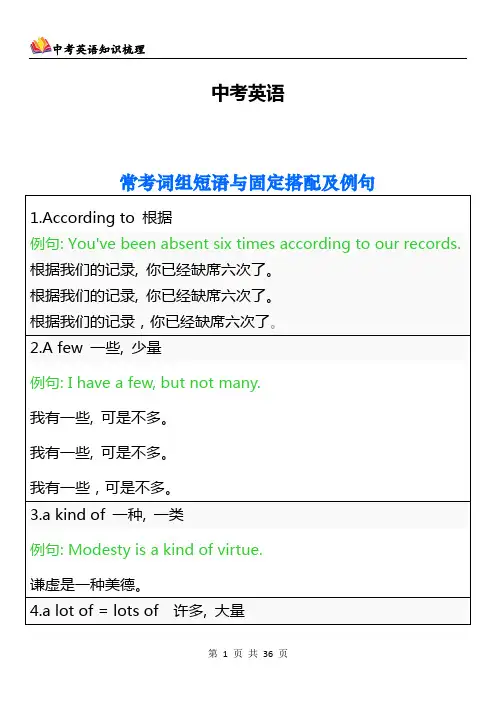
中考英语常考词组短语与固定搭配及例句1.According to 根据例句: You've been absent six times according to our records. 根据我们的记录, 你已经缺席六次了。
根据我们的记录, 你已经缺席六次了。
根据我们的记录,你已经缺席六次了。
2.A few 一些, 少量例句: I have a few, but not many.我有一些, 可是不多。
我有一些, 可是不多。
我有一些,可是不多。
3.a kind of 一种, 一类例句: Modesty is a kind of virtue.谦虚是一种美德。
4.a lot of = lots of 许多, 大量例句: I think a lot of people still underestimate him我觉得很多人仍然低估了他。
5.a pair of 一双, 一副a pair of scissors/shoes/trousers一把剪刀/一双鞋子/一条裤子例句: A pair of dancers are performing on the dance floor.一对舞伴正在舞池里表演。
6.a piece of 一块, 一张, 一片例句: picked up a piece of wood and started carving.我拿起一块木头, 开始雕刻起来。
我拿起一块木头, 开始雕刻起来。
我拿起一块木头,开始雕刻起来。
7.After class 课后例句: After class, I go to play basketball with my friends. 下课后, 我和我的朋友去打篮球。
下课后, 我和我的朋友去打篮球。
下课后,我和我的朋友去打篮球。
8.agree to do sth 同意做某事例句: I agree to do the job.我同意做这项工作9.agree with sb 同意某人的看法例句: No, I'm sorry, I can't agree with you不, 很抱歉, 我不同意你的看法。
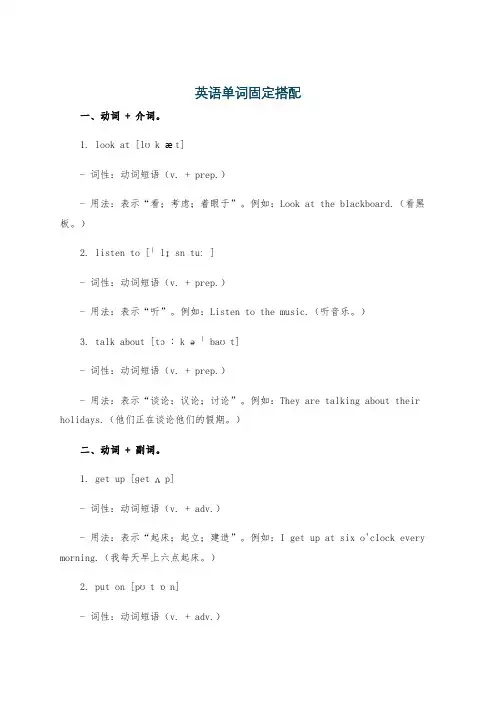
英语单词固定搭配一、动词 + 介词。
1. look at [lʊk æt]- 词性:动词短语(v. + prep.)- 用法:表示“看;考虑;着眼于”。
例如:Look at the blackboard.(看黑板。
)2. listen to [ˈlɪsn tuː]- 词性:动词短语(v. + prep.)- 用法:表示“听”。
例如:Listen to the music.(听音乐。
)3. talk about [tɔːk əˈbaʊt]- 词性:动词短语(v. + prep.)- 用法:表示“谈论;议论;讨论”。
例如:They are talking about their holidays.(他们正在谈论他们的假期。
)二、动词 + 副词。
1. get up [ɡet ʌp]- 词性:动词短语(v. + adv.)- 用法:表示“起床;起立;建造”。
例如:I get up at six o'clock every morning.(我每天早上六点起床。
)2. put on [pʊt ɒn]- 词性:动词短语(v. + adv.)- 用法:表示“穿上;上演;增加;假装;使……上场”。
例如:Put on your coat. It's cold outside.(穿上你的外套。
外面很冷。
)3. take off [teɪk ɒf]- 词性:动词短语(v. + adv.)- 用法:表示“起飞;脱下;离开;突然成功”。
例如:The plane will take off soon.(飞机很快就要起飞了。
)三、形容词 + 介词。
1. be good at [biːɡʊ d æt]- 词性:形容词短语(adj. + prep.)- 用法:表示“擅长于……”。
例如:He is good at English.(他擅长英语。
)2. be interested in [biːˈɪntrəstɪ d ɪn]- 词性:形容词短语(adj. + prep.)- 用法:表示“对……感兴趣”。
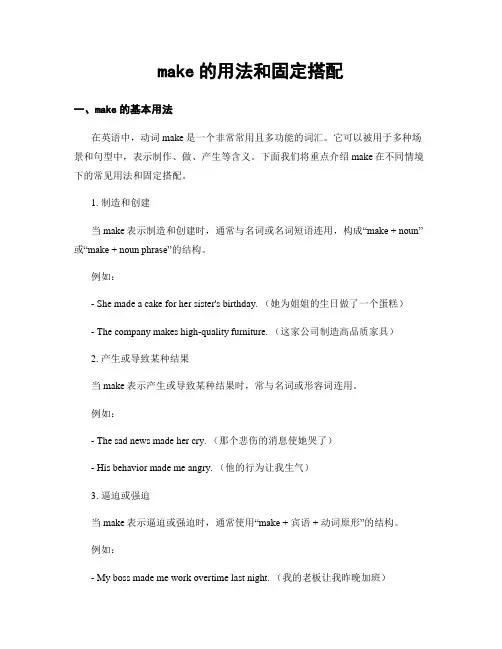
make的用法和固定搭配一、make的基本用法在英语中,动词make是一个非常常用且多功能的词汇。
它可以被用于多种场景和句型中,表示制作、做、产生等含义。
下面我们将重点介绍make在不同情境下的常见用法和固定搭配。
1. 制造和创建当make表示制造和创建时,通常与名词或名词短语连用,构成“make + noun”或“make + noun phrase”的结构。
例如:- She made a cake for her sister's birthday. (她为姐姐的生日做了一个蛋糕)- The company makes high-quality furniture. (这家公司制造高品质家具)2. 产生或导致某种结果当make表示产生或导致某种结果时,常与名词或形容词连用。
例如:- The sad news made her cry. (那个悲伤的消息使她哭了)- His behavior made me angry. (他的行为让我生气)3. 逼迫或强迫当make表示逼迫或强迫时,通常使用“make + 宾语 + 动词原形”的结构。
例如:- My boss made me work overtime last night. (我的老板让我昨晚加班)- They made the students clean the classroom. (他们让学生们打扫教室)二、make的固定搭配除了基本用法外,make还有一些常见的固定搭配,这些搭配习惯成自然,需掌握在口语和书面表达中。
1. Make a decision(做决定)- I need more time to make a decision about which university to attend. (我需要更多的时间来决定上哪个大学)2. Make an effort(努力)- You should make an effort to improve your English skills. (你应该努力提高你的英语水平)3. Make an appointment(约定、预约)- I made an appointment with the doctor for next Tuesday. (我约了下周二去看医生)4. Make a difference(产生影响)- Your donation can make a difference in someone's life. (你的捐赠能够改变某人的生活)5. Make progress(取得进步)- He has been studying hard and making great progress in his Chinese language skills. (他一直在努力学习,汉语水平取得了很大进步)6. Make a mistake(犯错误)- It's okay to make mistakes as long as you learn from them. (只要你能从错误中吸取教训,犯错没关系)7. Make money(赚钱)- He started his own business and now he's making a lot of money. (他开了一家公司,现在挣了很多钱)8. Make friends(交朋友)- When you travel, you have the opportunity to make friends from different countries. (旅行时,你有机会结交来自不同国家的朋友)9. Make a plan(制定计划)- We need to make a plan for our upcoming vacation. (我们需要为即将到来的假期制定一个计划)10. Make a difference(产生影响)- Small changes in your daily habits can make a big difference in your overall health. (日常习惯的小改变可以对整体健康产生重大影响)总结:Make作为一个非常常用的动词,在英语中有着多种用法和固定搭配。
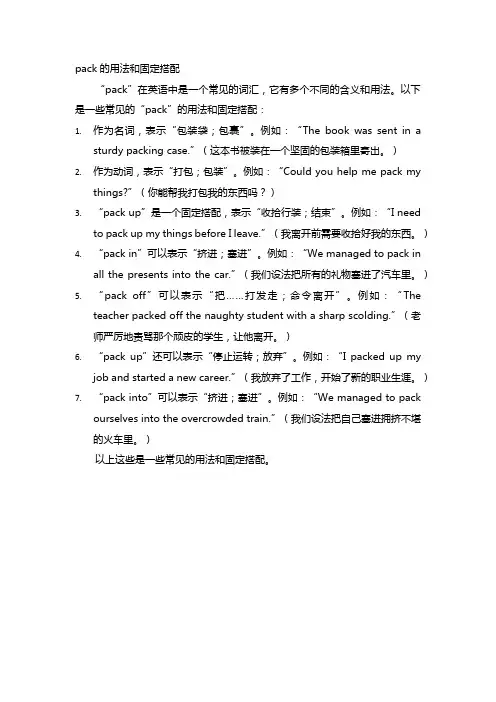
pack的用法和固定搭配“pack”在英语中是一个常见的词汇,它有多个不同的含义和用法。
以下是一些常见的“pack”的用法和固定搭配:1.作为名词,表示“包装袋;包裹”。
例如:“The book was sent in asturdy packing case.”(这本书被装在一个坚固的包装箱里寄出。
)2.作为动词,表示“打包;包装”。
例如:“Could you help me pack mythings?”(你能帮我打包我的东西吗?)3.“pack up”是一个固定搭配,表示“收拾行装;结束”。
例如:“I needto pack up my things before I leave.”(我离开前需要收拾好我的东西。
)4.“pack in”可以表示“挤进;塞进”。
例如:“We managed to pack inall the presents into the car.”(我们设法把所有的礼物塞进了汽车里。
)5.“pack off”可以表示“把……打发走;命令离开”。
例如:“Theteacher packed off the naughty student with a sharp scolding.”(老师严厉地责骂那个顽皮的学生,让他离开。
)6.“pack up”还可以表示“停止运转;放弃”。
例如:“I packed up myjob and started a new career.”(我放弃了工作,开始了新的职业生涯。
)7.“pack into”可以表示“挤进;塞进”。
例如:“We managed to packourselves into the overcrowded train.”(我们设法把自己塞进拥挤不堪的火车里。
)以上这些是一些常见的用法和固定搭配。
like的用法和固定搭配例句一、like的基本用法介绍"Like"是英语中常见且多功能的词汇之一。
它可以作为动词、名词和介词使用,表示喜欢、相似以及偏好等不同含义。
在本文中,将重点讨论like作为动词时的用法和固定搭配例句。
二、表示喜欢的用法1. 常规用法:当like表示喜欢或享受时,通常接后接动名词或名词。
例句:- I like swimming in the sea.(我喜欢在大海里游泳。
)- She likes playing guitar.(她喜欢弹吉他。
)2. 表示喜好:like也可用于表达个人对某种事物的偏好。
例句:- He doesn't just like sports; he loves them!(他不仅仅是喜欢运动,他热爱运动!)- I like chocolate ice cream better than vanilla.(与香草口味相比,我更喜欢巧克力口味。
)三、与verb形式的动词搭配1. 一般现在时:常与do结合使用。
例句:- Do you like to dance?(你喜欢跳舞吗?)- I don't like to wake up early on weekends.(我周末不喜欢早起。
)2. 过去式:常与did搭配,表示过去的喜好或习惯。
例句:- Did you like the movie we watched last night?(你喜欢昨晚我们看的电影吗?)- She didn't like broccoli when she was a child.(她小时候不喜欢西兰花。
)四、like作为介词时的固定搭配1. feel like + 动名词/代词:表达某人想要做某事的愿望或心情。
例句:- I feel like watching a movie tonight.(我想今晚看电影。
)- She felt like going for a walk after lunch.(午饭后她想散散步。
other的用法和固定搭配Other是一个常见的英语词汇,有多种不同的用法和固定的搭配方式。
下面我将为您详细介绍一些常见的用法和搭配。
1.形容词形式:- Other可以用作形容词,表示“其他的”,例如:I need some other books.(我需要其他的书)。
- 在比较级句型中,我们可以使用“the other”来表示“另一个”,例如:They have two cars. One is green, and the other is blue.(他们有两辆车,一辆是绿色的,另一辆是蓝色的)。
2.代词形式:- Other可以用作代词,表示“其他的人/事物”,例如:I already have this book, but I want to see what other people are reading.(我已经有这本书了,但我想看看其他人在读什么)。
3.名词形式:- Other可以用作名词,表示“其他人/事物”,例如:She is always thinking about others.(她总是在想别人)。
4.介词短语:- In other words:换句话说。
- Among other things:除此之外(还有其他的事情)。
- On the other hand:另一方面。
- Among others:等等,还有其他的。
5.习语表达:- The grass is always greener on the other side of the fence:隔岸观火,看别人家的好。
- Every other day:隔一天。
- The other way round:相反地。
6.固定搭配:- Other than:除了,不同于,例如:I don't eat any meat other than chicken.(我除了鸡肉之外不吃其他肉类)。
- One after the other:一个接一个地。
初中英语固定搭配应用英语学习中,固定搭配是一个非常重要的部分,掌握好各种固定搭配可以让我们的语言表达更加准确、自然。
在初中英语学习中,学生们需要通过大量的练习来掌握不同的固定搭配,从而提升自己的语言表达能力。
本文将重点介绍初中英语学习中常见的固定搭配,并给出相应的例句加以说明。
1. make a decision:做出决定- He finally made a decision to study abroad next year.2. take a break:休息- Let's take a break and have a cup of tea.3. put on weight:增加体重- She has put on weight since she started working.4. have fun:玩得开心- We had so much fun at the party last night.5. on time:准时- The train arrived on time this morning.6. in the end:最终- In the end, they decided to cancel the trip due to bad weather.7. at first:起初- At first, I didn't like the city, but now I've grown to love it.8. look forward to:期待- I'm looking forward to seeing you next week.9. pay attention to:注意- Please pay attention to the teacher during class.10. at the same time:同时- She can cook dinner and do homework at the same time.以上是一些初中英语学习中常见的固定搭配,希望同学们能认真记忆,并在写作或口语表达中灵活运用。
英语单词用法及固定搭配英语单词的用法可以分为词义和语法两个方面。
词义指一个单词所具有的意思和含义,而语法指单词在句子中所扮演的角色和所需要的语法结构。
固定搭配指的是一些词汇在特定语境中常常搭配使用的习惯表达方式,有助于准确理解和使用单词。
以下是几个常见的英语单词的用法及固定搭配示例:1. Take:-词义:表示动作“拿”或状态“花费”的意思。
- 固定搭配:take a shower (洗澡)、take a break (休息)、takea photo (拍照)。
2. Make:-词义:表示动作“制作”或状态“使成为”的意思。
- 语法:常用作及物动词,后接名词或不定式构成不同的用法,如make a cake (做蛋糕)、make someone happy (使人快乐)。
3.Go:-词义:表示动作“去”或状态“运转”的意思。
- 语法:常用作不及物动词,后接地点或副词构成不同的用法,如go to school (去学校)、go slowly (慢慢地走)。
- 固定搭配:go shopping (去购物)、go for a walk (去散步)、go on vacation (去度假)。
4. Have:-词义:表示动作“拥有”或状态“经历”的意思。
- 固定搭配:have breakfast (吃早餐)、have a meeting (开会)、have a conversation (进行对话)。
注意,这只是一些常见单词的用法及固定搭配示例,实际上英语单词的用法非常广泛多样。
要学好英语,除了掌握基础的词义和语法,还需要通过大量的阅读和实践来积累更多的用法和搭配。
高中英语知识点归纳固定搭配的用法及常见例子一、动词搭配1. be/get used to: 习惯于例句:She is used to getting up early in the morning.2. be/get accustomed to: 适应于例句:After living in the city for a year, he got accustomed to the busy lifestyle.3. take/bring about: 引起,导致例句:The new policy took about significant changes in the company.4. make/take (great) effort(s): 努力做某事例句:He made great efforts to pass the exam.5. make/take advantage of: 利用例句:She always takes advantage of her free time to read books.6. take/have (no) effect on: 对...(没有)影响例句:The medicine had no effect on his illness.7. give (somebody) a hand: 帮助某人例句:Can you give me a hand with these heavy bags?8. pay attention to: 注意例句:You should pay attention to the teacher during class.二、名词搭配1. a series of: 一系列的例句:He has watched a series of movies this summer.2. a great deal of: 大量的例句:There is a great deal of information on the Internet.3. a variety of: 各种各样的例句:There is a variety of food at the buffet.4. a number of: 许多的例句:A number of students attended the school trip.5. take (the) place of: 代替例句:Computers have taken the place of typewriters in most offices.6. in search of: 寻找例句:He traveled around the world in search of adventure.7. be of great importance: 非常重要例句:Education is of great importance in one's life.8. make a difference: 产生影响例句:Your kind words can make a difference to someone's day.三、形容词搭配1. be/get used to: 习惯于例句:She is used to the cold weather in winter.2. be/get tired of: 对...感到厌倦例句:I am tired of eating the same food every day.3. be/get ready for: 为...做好准备例句:They are getting ready for the upcoming exam.4. be/get (un)happy with: 对...(不)满意例句:I am not happy with the service at this restaurant.5. be/get (un)comfortable with: 对...(不)舒服例句:He is uncomfortable with public speaking.6. be/get familiar with: 熟悉例句:She is familiar with the city because she lived here for years.7. be/get interested in: 对...感兴趣例句:I am interested in learning new languages.8. be/get acquainted with: 与...熟悉例句:They got acquainted with each other at the party.综上所述,以上是高中英语知识点归纳固定搭配的用法及常见例子。
中考英语常考词组短语与固定搭配及例句一、常考词组短语1. break up (分开;打碎)- They broke up after being together for five years.(他们在一起五年后分手了。
)- Be careful not to break up the glass.(小心别把玻璃打碎。
)2. get along with (与...相处;和...友好相处)- She gets along with all her classmates.(她和她所有的同学相处得很好。
)- I find it hard to get along with my boss.(我发现和我的老板相处很难。
)3. give up (放弃)- Don't give up just because it's hard.(不要因为困难就放弃。
)- She gave up smoking a year ago.(她一年前戒烟了。
)4. be interested in (对...感兴趣)- I'm interested in learning foreign languages.(我对学习外语很感兴趣。
)- Are you interested in joining the school band? (你对参加校乐队感兴趣吗?)5. make up (弥补;组成;编造)- We need to make up for the lost time.(我们需要弥补失去的时间。
)- The committee is made up of five members.(委员会由五名成员组成。
)- She made up a story to explain her absence.(她编了个故事来解释她的缺席。
)二、常考固定搭配1. in the end (最后;终于)- We worked hard, and in the end, we succeeded. (我们努力工作,最后我们成功了。
英语词汇固定搭配用法和典型案例
教书育人楷模,更好地指导自己的学习,让自己不断成长。
让我们一起到学习啦学习吧!以下是学习啦小编为大家编辑的英语学习方法文章,欢迎大家阅读!
英语词汇:regret cease try等词的固定搭配用法
regret to do 对要做的事遗憾。
(未做)
regret doing 对做过的事遗憾、后悔。
(已做)
I regret to have to do this, but I have no choice.
我很遗憾必须这样去做,我实在没有办法。
I don't regret telling her what I thought.
我不为告诉她我的想法而后悔。
典型例题
---You were brave enough to raise objections at the meeting.
---Well, now I regret ___ that.
A. to do
B. to be doing
C. to have done
D. having done
答案:D。
regret having done sth. 对已发生的事感到遗憾。
regret to do sth. 对将要做的事感到遗憾。
本题为对已说的话感到后悔,因此选D。
try to do 努力,企图做某事。
try doing 试验,试着做某事。
You must try to be more careful.
你可要多加小心。
I tried gardening but didn't succeed.
我试着种果木花卉,但未成功。
go on to do 做了一件事后,接着做另一件事。
go on doing 继续做原来做的事。
After he had finished his maths,he went on to do his physics.
做完数学后,他接着去做物理。
Go on doing the other exercise after you have finished this one.
作完这个练习后,接着做其他的练习
cease to do 长时间,甚至永远停做某事。
cease doing 短时停止做某事,以后还会接着做。
That department has ceased to exist forever.
那个部门已不复存在。
The girls ceased chatting for a moment when their teacher passed by.
姑娘们在老师走过时,停了会聊天。
mean to do 打算、想
mean doing 意味着
I mean to go, but my father would not allow me to.
我想去,但是我父亲不肯让我去。
To raise wage means increasing purchasing power.
赠加工资意味着增加购买力。
英语词汇用法:stop to do与stop doing等词组的区别
stop to do 停止,中断做某事后去做另一件事。
stop doing 停止做某事。
They stop to smoke a cigarette. 他们停下来,抽了根烟。
I must stop smoking. 我必须戒烟了。
典型例题
She reached the top of the hill and stopped ___ on a big rock by the side of the path.
A. to have rested
B. resting
C. to rest
D. rest
答案:C。
由题意可知,她到了山顶,停下来在一个路边的大石头上休息。
因此,应选择"stop to do sth. 停下来去做另一件事"。
而不仅仅是爬山动作的终止,所以stop doing sth.不正确。
forget to do 忘记要去做某事。
(未做)
forget doing 忘记做过某事。
(已做)
The light in the office is stil on. He forgot to turn it off.
办公室的灯还在亮着,它忘记关了。
(没有做关灯的动作)
He forgot turning the light off.
他忘记他已经关了灯了。
( 已做过关灯的动作)
Don't forget to come tomorrow.
别忘了明天来。
(to come动作未做)
典型例题
---- The light in the office is still on.
---- Oh,I forgot___.
A. turning it off
B. turn it off
C. to turn it off
D. having turned it off
答案:C。
由the light is still on 可知灯亮着,即关灯的动作没有发生,因此用forget to do sth.
而forget doing sth表示灯已经关上了,而自己忘记了这一事实。
此处不符合题意。
remember to do 记得去做某事 (未做)
remember doing 记得做过某事 (已做)
Remember to go to the post office after school.
记着放学后去趟邮局。
Don't you remember seeing the man before?
你不记得以前见过那个人吗?。